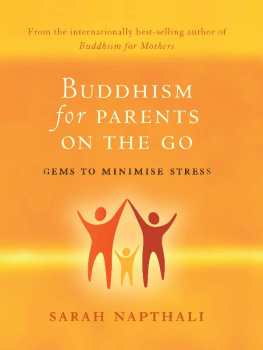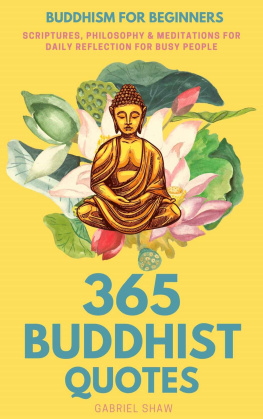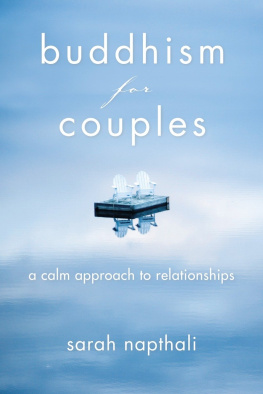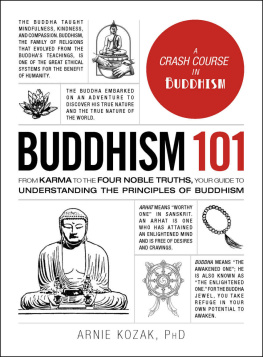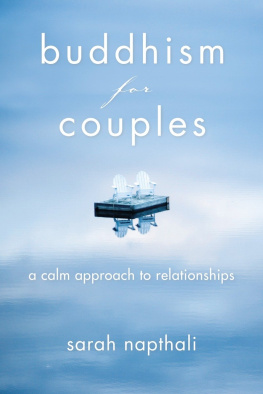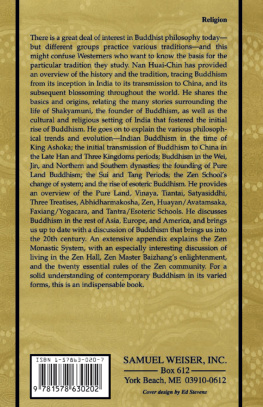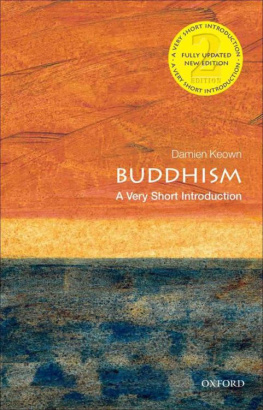OTHER BOOKS BY SARAH NAPTHALI
Buddhism for Mothers
Buddhism for Mothers of Young Children
(previously published as Buddhism for Mothers
with Lingering Questions)
Buddhism for Mothers of Schoolchildren
BUDDHISM
for PARENTS
ON THE GO
GEMS TO MINIMISE STRESS

SARAH NAPTHALI

First published in 2010
Copyright Sarah Napthali 2010
All rights reserved. No part of this book may be reproduced or transmitted in any form or by any means, electronic or mechanical, including photocopying, recording or by any information storage and retrieval system, without prior permission in writing from the publisher. The Australian Copyright Act 1968 (the Act) allows a maximum of one chapter or 10 per cent of this book, whichever is the greater, to be photocopied by any educational institution for its educational purposes provided that the educational institution (or body that administers it) has given a remuneration notice to Copyright Agency Limited (CAL) under the Act.
Inspired Living, an imprint of
Allen & Unwin
83 Alexander Street
Crows Nest NSW 2065
Australia
Phone: (61 2) 8425 0100
Fax: (61 2) 9906 2218
Email: info@allenandunwin.com
Web: www.allenandunwin.com
Cataloguing-in-Publication details are available
from the National Library of Australia
www.librariesaustralia.nla.gov.au
ISBN 978 1 74237 495 6
eISBN 978 1 74269 213 5
Internal design by Ellie Exarchos
Typeset by Bookhouse, Sydney
To my friend Anna Street
for all your encouragement
and Jenni Sheldon
for your hundreds of volunteer hours at school
CONTENTS
Why should Buddhist teachings only be available to those with some time up their sleeves? Busy parents might feel they need to wait until they have more spare hours before they can start to explore the teachings, but this is not the case. It is possible to practise while you are rushing children out the door, while you sit in traffic, while you perform your errands, supervise homework or deal with colleagues.
You can benefit from the teachings by applying them to any aspect of your life, regardless of the life stage you are at. Daily meditation, ten-day retreats and involvement with a Buddhist group are definitely ideal and perhaps even a longer-term goal for you. Yet there is no need to postpone a practice of mindfulness, compassion, peace and ethics, for you can benefit from these as soon as you choose to.
The Buddhas teachings have been put to the test over the past 2500 years in many diverse countries and cultures. His middle way is recognised by its practitioners as a road out of the stress of any moment into the freedom that comes from letting go of the causes of our self-created suffering.
You may prefer not to read this book in order, but to choose your own pathway. The table of contents can be your guide, as it lists the various forms and sources of stress for busy parents. You should be able to find some of your own therealong with some of the Buddhas timeless wisdom for letting go of the causes of your stress.
ADJUSTING TO NEW
SURROUNDINGS
Once I was in a reality TV show. Noreally I was. In 2008 I belonged to a soul-music choir and we competed in a show called Battle of the Choirs. I found adjusting to the foreign environment and pressure of a television studio profoundly stressful. The days were thirteen hours long. We were learning new songs and choralography (read dance steps) and I felt way out of my depth: being one of the least talented members of a choir dominated by music teachers, I was worried about letting them downon national television.
I decided to observe my reaction to stress, which went something like this: No! You cant be stressed! You must be calm! Nobody else is ruffled! Be cool and laid-back. Youre the only Buddhist here so the least you cando is keep your head. Clearly, I was blocking my feelings: suppressing, denying and ignoring the stress gripping my body. This was not mindfulness. Rather, I needed to be with my feelings of stress, with an attitude of allowing. Resistance to the stress was only compounding it. Practising awareness of my bodily reactions and of my thoughts was the most effective way to minimise my panic and a far more compassionate way to treat myself. Accepting my reactions, I settled down (hid in the back row) and we made it as far as the semi-finals.
See also
Have we not all been trained to be vain? How strongly we all long to feel attractive. We also want to feel healthy and capable of all the physical feats of our youth. What a psychological challenge ageing can beWesterners hate it. How to cope?
Buddhists know some techniques, but these do seem very counterintuitive to the Western mind. They include meditating in a graveyard, meditating on the disintegration of the human body before and after death, or repeating the mantra birth, ageing, pain and death. I admit that most Westerners cannot stomach these techniques, though my friend, the Buddhist teacher Subhana Barzaghi, at the age of nineteen spent 30 days in Nepal meditating on death. (Of 150 Westerners, only 30 completed the retreat.)
What Westerners can do is spend more time contemplating the Buddhas teaching of impermanence, the way nothing lasts. Notice it in nature. Notice it in people. Notice it in objects. Impermanence is the only thing we can count on; change is the only constant. Denial and aversion are mentally unhealthy ways to cope with the advancing years and can only lead to ever-increasing anxiety. Mindful of the certainty of death, we live our lives more thoughtfully as we appreciate each new day, each new moment. Acceptance of impermanence, understanding that we are not excluded from this natural law, is our best hope for ageing calmly.
Funny how sometimes the simplest things can bother us so much. One reason is that rather than seeing something for what it is, we add. We aggravate. Many Buddhists make a habit of asking themselves whenever they feel stressed, What am I adding? For example, I am a slave to a tree in our backyard that sheds many leaves, so I often find myself raking. Zen Buddhists would encourage me to see this activity as just raking. In my head, however, I add: This is such a waste of mytime, This is so repetitive and boring, I wish the council would let us removethis tree, Why arent I getting the kids to do this? In adding all this (and more), I am not being mindful. I miss an opportunity to experience the sensory feast of the present moment: the scratch of the rake, the crunch of the leaves underfoot, the fragrances of nature, the colours of the leaves, the satisfaction of an active body. Zen Buddhists would call the raking work practicesuch tasks need not be separate from meditation or other spiritual activities. Just raking is potentially an experience of mindfulness in the present moment. This goes equally for just sweeping, just dusting, just cooking, just wiping and just hangingout the washing. And then there is just being with our children, justwatching them or just listening.
See also
In a book called
Next page
